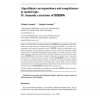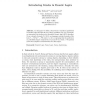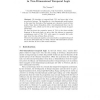27 search results - page 4 / 6 » The Modal Formula (...) Is Not First-Order Definable |
110
Voted
JANCL
2008
15 years 2 months ago
2008
ABSTRACT. In [CON 06b] we introduced the algorithm SQEMA for computing first-order equivalents and proving canonicity of modal formulae, and thus established a very general corresp...
108
Voted
DEON
2008
Springer
15 years 4 months ago
2008
Springer
In this paper we define a framework to introduce gradedness in Deontic logics through the use of fuzzy modalities. By way of example, we instantiate the framework to Standard Deont...
136
Voted
ICTL
1994
15 years 6 months ago
1994
We introduce a temporal logic TAL and prove that it has several nice features. The formalism is a two-dimensional modal system in the sense that formulas of the language are evalua...
121
Voted
FSTTCS
2006
Springer
15 years 6 months ago
2006
Springer
We establish a decidability boundary of the model checking problem for infinite-state systems defined by Process Rewrite Systems (PRS) or weakly extended Process Rewrite Systems (w...
112
Voted
LOGCOM
2007
15 years 2 months ago
2007
The syntactic approach to epistemic logic avoids the logical omniscience problem by taking knowledge as primary rather than as defined in terms of possible worlds. In this study, ...



